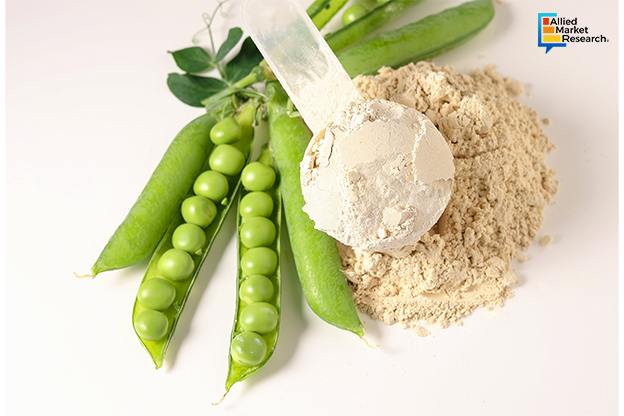Unleashing the Power of Pea Protein Toward Fitness

29 Nov
2023
Nowadays, individuals are inclined to make the right food choices to remain fit. Pea protein has become a new buzz among health-conscious individuals due to its numerous health benefits. This protein is considered a nutritional powerhouse because of its low carbs and high protein content. Moreover, this plant-based protein is easy to digest and is highly beneficial in reducing the risk of many metabolic diseases such as cancers, diabetes, and cardiovascular diseases. This article includes pea protein’s nutritional properties, health benefits, and the contribution of leading players in reshaping the industry.  
Nutritional properties and health benefits of pea protein driving the industry:
Pea protein is a plant-based alternative to animal proteins, containing a similar amount of nutrition profile. However, it is more sustainable, planet-friendly, and vegan-friendly. Consuming these plant-based proteins can also enhance the metabolism rate of individuals, as they contain all nine essential amino acids. Moreover, peas are a great source of fiber, iron, and vitamins, helpful in decreasing the risk of several inflammatory diseases with their robust antioxidant properties. 
These days, many people are struggling with muscle weakness and low muscle strength due to a lack of protein intake in their daily diets. Consuming such proteins can promote muscle thickness and strength while maintaining gut health as well. Recent studies on plant-based protein concluded that pea protein can remarkably improve bicep muscle thickness during the 8-week training of Squats and Deadlifts.
Additionally, as these proteins are naturally free from fats and cholesterols, unlike whey protein, they can help keep arteries clean and healthy. Adding these proteins to the diet can help reduce the levels of angiotensin (a chemical narrowing blood vessels), hence, improving heart health significantly. Further, for people following a weight-loss routine, this type of protein is very supportive in their journey. It is easily soluble in water and can be added to smoothies, unlike other protein powders. It gives a feeling of fullness and reduces cravings, acting as a satisfactory intake yet with a better taste for individuals. 
The pea protein market is experiencing promising growth owing to the increasing preferences for products among individuals that are good for gut health, environment-friendly, and healthy. Based on application, the dietary supplement segment is expected to hold the lion’s share by generating a revenue of $83.0 million over the estimated timeframe from 2022 to 2031. Country-wise, Australia is predicted to manifest a CAGR of 11.3% over the analysis period. 
New product launches in the industry:
To cater to the growing demand for organic products among individuals globally, several leading players have come up with beneficial product launches. A notable example is the launch of a new line of organic pea ingredients such as organic pea protein and starch by Roquette, a leading French-based provider of plant-based ingredients. With this launch, the company aimed to address the growing consumer demand for organic pea ingredients across the North American and Western European regions. 
Mergers and acquisitions among leading market players:
Recently, BENEO, a leading provider of plant-based ingredients announced its acquisition of Meatless BV, a renowned producer of plant-based protein from pea, wheat, and quinoa. With this acquisition, the companies aimed to expand their portfolios by offering a wide range of plant-based proteins. 
Another instance is the acquisition of Vestkorn Milling, a leading producer of pea- and bean-based ingredients, by DSM, a global science-based company. This acquisition would help DSM to expand its product portfolio by providing plant-based proteins by using Milling’s wide product range including pea protein, pea fiber, and pea starch. 
To sum up, the growing shift of individuals towards plant-based products due to their eco-friendliness and numerous health advantages can augment the market’s growth with new heights. Moreover, the remarkable effects of pea proteins on gut health can fuel the market with new growth opportunities owing to the rising sedentary lifestyles.

Rosy Behera
Author's Bio- Rosy Behera holds a bachelor’s degree in Electrical and Electronics Engineering and now she is a content writer by profession. She loves to portray her thoughts and ideas with a nice command of words. Grabbing an audience with her creative write-ups is one of her biggest assets so far. Apart from writing, she is a certified “Odisi” dancer and has done Gardharva in Drawing, Painting, and Arts. She always explores new things through travel and is a big foodie.
Avenue: Entire Library membership of Allied Market Research Reports at your disposal
- Avenue is an innovative subscription-based online report database.
- Avail an online access to the entire library of syndicated reports on more than 2,000 niche industries and company profiles on more than 12,000 firms across 11 domains.
- A cost-effective model tailored for entrepreneurs, investors, and students & researchers at universities.
- Request customizations, suggest new reports, and avail analyst support as per your requirements.
- Get an access to the library of reports at any time from any device and anywhere.
Related Post
-
How are Submarine Cables Transforming Global Connectivity with Enhanced User Experience?
-
Endoscopy Procedures: Transformations in Techniques and Applications
-
AI-Powered Video Analytics: How the Product Actually Works for enterprises
-
Painting Robots: Transforming Precision Coating and Creative Applications
-
Innovations in Pharmacovigilance Systems Advancing Patient Safety
-
Understanding Edge Security: Keeping Data Safe Near the Source
-
Exploring the Use and Advancements of 3D Laser Scanners in Professional Applications
-
Reinforcing Industrial Controls with Smarter Tools and Training








